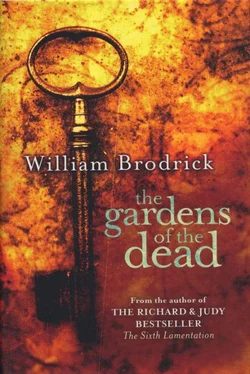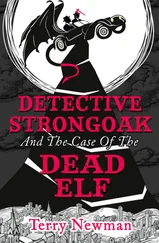William Brodrick - The Gardens of the Dead
Здесь есть возможность читать онлайн «William Brodrick - The Gardens of the Dead» весь текст электронной книги совершенно бесплатно (целиком полную версию без сокращений). В некоторых случаях можно слушать аудио, скачать через торрент в формате fb2 и присутствует краткое содержание. Жанр: Триллер, на английском языке. Описание произведения, (предисловие) а так же отзывы посетителей доступны на портале библиотеки ЛибКат.
- Название:The Gardens of the Dead
- Автор:
- Жанр:
- Год:неизвестен
- ISBN:нет данных
- Рейтинг книги:4 / 5. Голосов: 1
-
Избранное:Добавить в избранное
- Отзывы:
-
Ваша оценка:
- 80
- 1
- 2
- 3
- 4
- 5
The Gardens of the Dead: краткое содержание, описание и аннотация
Предлагаем к чтению аннотацию, описание, краткое содержание или предисловие (зависит от того, что написал сам автор книги «The Gardens of the Dead»). Если вы не нашли необходимую информацию о книге — напишите в комментариях, мы постараемся отыскать её.
The Gardens of the Dead — читать онлайн бесплатно полную книгу (весь текст) целиком
Ниже представлен текст книги, разбитый по страницам. Система сохранения места последней прочитанной страницы, позволяет с удобством читать онлайн бесплатно книгу «The Gardens of the Dead», без необходимости каждый раз заново искать на чём Вы остановились. Поставьте закладку, и сможете в любой момент перейти на страницу, на которой закончили чтение.
Интервал:
Закладка:
He worked feverishly Puffs of dust made him cough and spit. By the late afternoon he’d finished. The building had been stripped. Panting, he stood in the living room. Sweat touched the nape of his neck like a hand: who had posted the photograph of Walter?
He hadn’t looked at the picture since the day it had fallen from the envelope. But he could still see the man he wouldn’t call Dad, the man no one pushed around, the biggest man in the street. Walter had kept dumb-bells under the bed. He’d done press-ups. He’d boxed the air, snorting and whistling -he’d been a southpaw He’d smelled of liniment. Riley saw him only in the evenings because he got up at four o’clock to work at the warehouse. After he was made redundant he had to sell pies from a barrow He was known as the Pieman. And there wasn’t a picture of him left on the planet, except the one that had fallen onto the kitchen table. Riley couldn’t understand it. He’d burnt them all over forty years ago. Sweat crawled down his back. Who could have posted the photograph? There was no one he could think of. They were all dead.
Riley sat against the wall, hands resting on his knees. Rat droppings were scattered like tiny black seeds along the skirting board. The damp and the quiet closed in upon him.
Major Reynolds at the Salvation Army hostel had always worn a neatly pressed uniform. He had a pencil moustache like that of a Battle of Britain pilot and years of cornet playing had left a small indentation on his upper lip. A shiny square face and prominent black eyebrows completed the impression of military distinction. Riley never learned his first name. He was just ‘the Major.
When this quiet soldier saw the blade in Riley’s sock, he should have thrown him back onto the street. But he didn’t. Instead, he pulled the runaway into his office, threw the knife in the bin and said, ‘You’re a grown-up now.’
Riley smiled, like kids do when they’re nervous.
‘You’re a man.’
Riley’s eyes glazed, but he kept the smile.
‘And a man should think deeply’ said the Major, unperturbed. He folded his arms, and his dark eyebrows made a frown. He measured Riley up and down with a long, calculating gaze, as if to guess the size of his clothes.
The next day the Major called Riley back into his office. He stood with legs crossed, leaning back on his desk. He’d put in a good word to another trooper in the Army a manager at McDougall’s on the Isle of Dogs.
‘There’s a job if you want it,’ he said.
‘Doing what?’ He stared at the Major’s gleaming shoes. Even the soles were clean.
‘Stacking crates of self-raising flour.’
Riley had seen the ads everywhere. They made it out to be some kind of miracle when it was just a mix of chemicals. He said, ‘Nothing rises on its own.’
The Major narrowed his eyes, like a gambling man, wondering if there was another level to the remark. Uncertainly he said, ‘No, it doesn’t.’
Riley never went back to the Sally Ann. He worked hard. He learned how to operate a crane. He saved up. He bought a bungalow. And he bought Quilling Road. The idea was to rent it out and build up an investment, but it turned into something else. No, that wasn’t true. It was a choice; a rambling, complicated, murky series of impulses and actions, but, in the end, a very deep kind of choice; something cold and murderous. It was similar to being in one of his rages. It was as if he were watching himself, and he felt nothing at what he saw.
The docks were dying, but Riley survived. After he was made redundant, he found a job the same week at Lawton’s, where he met Nancy Dumpy Nancy with her hungry eyes. He first saw her from on high, looking down from his crane. He seemed to see her close-up for who she was. She walked timidly as if she’d been hurt. That’s when he first thought of selling Quilling Road. He seriously thought of packing up. But he didn’t. One lunchtime he went into the manager’s office intending to ask her out… because there was something about her that had stirred him, that had lit a small flame in his guts… But on the day when he opened his mouth, he’d asked her to stamp his card while he went AWOL to catch his rent. That sudden shift of intention, the deception of Nancy had thrilled him, as if it were a kind of arson. (Riley understood the excitement of a building on fire.) So that was another choice -an even deeper one, from a frozen place inside himself. Unlike getting married to Nancy. That happened as if it were inevitable. The courting went like a dream. He did everything that he’d seen in the films: aftershave, greased hair, a natty suit – the lot. He took Nancy to a big hotel, ordered high tea and paid with crisp bills fresh from the bank. He left a fat tip. He held out his arm for Nancy. On Brighton beach, he tossed his trilby into the wind. But when they got married, and they went home, and she was there first thing in the morning and last thing at night.., he felt sick. He didn’t know what to do in the day to day He scoured his past, lifting its slabs, jerking open its drawers, trying desperately to find something that would teach him what to do. But there was nothing there, except loathing and disgust, like a warm mist. And there before him, day and night, was Nancy Dumpy Nancy with her hungry eyes. She was a breathing accusation.
And then help came from a very strange quarter, although he didn’t see it that way at the time: a woman in black arrived on the wharf with a few heavies in uniform. Twenty minutes later he was arrested. From that moment, the focus of Nancy’s anguish shifted from who he was to what someone had said he’d done. And that gave him space. Not much, but space nonetheless.
Riley swept up the rat droppings and put the pan and brush back in a hallway cupboard. As he closed the door he heard that polished voice as if it were on the other side. He saw the scrubbed nails, the white cuffs, the starched trousers.
A man should think deeply; he should know himself.’
Riley had studied the Major’s cap-badge motto, ‘Blood and Fire’, in a panic, unable to comprehend why this man should care at all.
‘I know myself better than you ever will, Major. I’ve been places.., in here’ – he’d pointed savagely at his head, as if it were a distant continent – ‘that you’ve only heard about.’
‘I don’t mean what you’ve done. I mean who you are. The man behind the mistakes and the wrong turns.’ The Major leaned forwards, placing a hand on each knee, like the medic on a football pitch. He stared at Riley his eyes clean and unbearably merciful. ‘They’re not the same, you know’
They’re not the same. The strange words spiralled down forty years into an empty house in Tottenham. Riley’s mind grew dark – even his eyes seemed to drain of light. How could you separate a man from what he’d done? Like a flicker of flame in the grate, Riley remembered himself standing at the bedroom door, a boy in pyjamas, watching Walter punch and stab the air.
4
Anselm was drinking tea in a cafe ten minutes early for his meeting with Inspector Cartwright. Roughly ten minutes after the agreed time he saw a figure dodging between the cars on Coptic Street. A magenta scarf fluttered against a long black overcoat.
Anselm had first met Inspector Cartwright during the Riley trial. Afterwards he’d seen her once or twice smoking in the corridors of the Bailey. Their eyes had met; and Anselm, being the sensitive sort, had detected a measure of hostility. That expression, it seemed, had not left her face.
‘Sorry I’m late,’ she said sweetly sitting down, ‘three kids under five. Don’t do it.’
‘I’ll try not to.’ Each ear was weighted with a substantial holly-berry earring, irregular in shape, probably painful to wear and undoubtedly made by one of the under-fives. Her hair was a deep, rusty brown; it had been cut very short, leaving precise lines. ‘I think when we last met,’ she said kindly ‘you’d just opened the door to let Mr Riley out.’
Читать дальшеИнтервал:
Закладка:
Похожие книги на «The Gardens of the Dead»
Представляем Вашему вниманию похожие книги на «The Gardens of the Dead» списком для выбора. Мы отобрали схожую по названию и смыслу литературу в надежде предоставить читателям больше вариантов отыскать новые, интересные, ещё непрочитанные произведения.
Обсуждение, отзывы о книге «The Gardens of the Dead» и просто собственные мнения читателей. Оставьте ваши комментарии, напишите, что Вы думаете о произведении, его смысле или главных героях. Укажите что конкретно понравилось, а что нет, и почему Вы так считаете.












